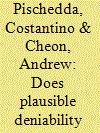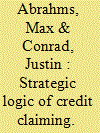| Srl | Item |
| 1 |
ID:
192519


|
|
|
|
|
| Summary/Abstract |
States conduct unclaimed coercive acts, imposing costs on adversaries to signal resolve but denying (or not claiming) responsibility. Some scholars posit that unclaimed acts have considerable potential to coerce targets, while containing escalation risks. Others suggest that unclaimed coercive efforts tend to fail and trigger escalation. We assess these competing perspectives about the effects of unclaimed attacks with a vignette experiment exposing US-based respondents to a scenario where, after Russia warns of unpredictable consequences if NATO continues providing weapons to Ukraine, an explosion occurs at a NATO base in Poland used to funnel weapons to Ukraine. Intelligence agencies and independent analysts identify Russia as the likely culprit, while not ruling out the possibility of an accident. We randomize whether Russia claimed or denied responsibility for the explosion and find that unclaimed acts have lower coercive leverage than claimed ones, but the two do not significantly differ in escalation risk.
|
|
|
|
|
|
|
|
|
|
|
|
|
|
|
|
| 2 |
ID:
153954


|
|
|
|
|
| Summary/Abstract |
In theory, terrorism is a political communication strategy for groups to convey their grievances and the costs of ignoring them. In practice, though, terrorist groups take responsibility for just a small portion of their attacks. Rather than getting credit for the violence, terrorist leaders generally deny their operatives committed it. This theoretical and empirical disconnect may explain why scholars have ignored the subject of unclaimed attacks despite these being the norm. With a mixed-methods research design, our study helps to fill this lacuna by proposing and testing a new theory to help account for variation in which attacks are claimed.
|
|
|
|
|
|
|
|
|
|
|
|
|
|
|
|
| 3 |
ID:
178909


|
|
|
|
|
| Summary/Abstract |
Rationalist research expects that groups claim credit for terrorism. Yet, the vast majority of attacks are not claimed. Of the unclaimed attacks, about half are attributed to a specific group. What factors impact claiming decisions? While extant literature largely treats claiming as binary—either claimed or not—the present study disaggregates claiming decisions further to also consider attacks with attributions of credit but no claim, using data from 160 countries between 1998 and 2016. Both attack-level and situational factors impact claiming decisions. Disaggregating claiming behavior shows meaningful differences. Specifically, competitive environments and suicide attacks increase claims but not attributions. Higher fatalities in general increase both claims and attributions, but when the target is civilian attributions decrease with a high body count whereas claims increase. Further, while the directional impact of other variables is the same, the magnitude of their effects vary between claims and attributions. Results are robust across modeling specifications. Findings demonstrate that our understanding of claiming behaviors is limited when claiming is treated as dichotomous. This study provides further insight into factors that impact claiming decisions for terrorism. Results can address data issues in academic research and inform counterterrorism responses.
|
|
|
|
|
|
|
|
|
|
|
|
|
|
|
|